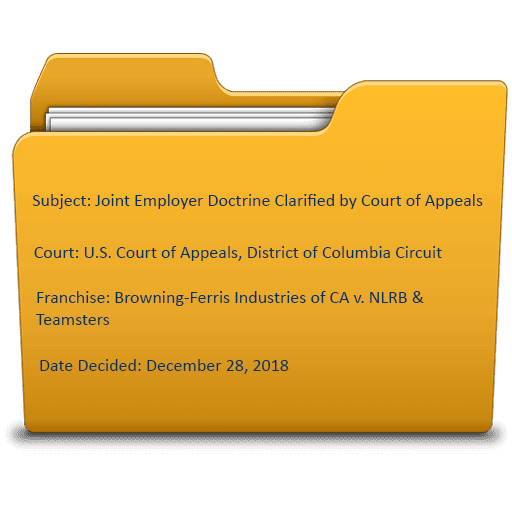
Regulars to this blog will observe that the control issue within franchising is a running theme and involves the Joint Employer Doctrine, which I discussed and updated in previous articles. Boiled down to its essence, the doctrine holds that if a Franchisor exerts substantial control over a Franchisee’s workforce, then the employment obligations of the Franchisee may become the joint obligations of the Franchisor. The dividing line separating franchisor/employer obligations has become blurred in recent years and has threatened to upset the franchise model, which relies upon a clear delineation between the Franchisor and the employer (read, the Franchisee). For more background on this issue, see https://www.kilcommonslaw.com/franchise/is-the-quest-to-expand-the-joint-employer-standard-over/, and see, https://www.kilcommonslaw.com/franchise/the-franchisors-dilemma-to-control-or-not-to-control/
As previously reported, the NLRB issued a split decision in Browning-Ferris Industries of California, Inc. (362 NLRB No. 186 8/27/2015)(“BFI”). In this decision, the NLRB adopted a two-part test to determine the existence of a joint employer relationship: (1) whether a common law employment relationship exists, and (2) whether the potential joint employer “possesses sufficient control over employee’s essential terms and conditions or employment to permit meaningful bargaining.” The Board found that companies could still be deemed joint employers based on the mere existence of “reserved” joint control, or based on indirect control or control that is “limited and routine.”
As a result of the decision, BFI was declared a joint employer with another company, Leadpoint, which provided the manpower for BFI’s recycling plants, and therefore, was obligated to enter into collective bargaining with the Teamsters seeking to organize the industry. BFI took the matter on appeal to the U.S. Court of Appeals. Although the NLRB’s decision did not directly address franchise relationships, its impact on the franchise model is clear and the reason it is being followed closely.
Last week, the DC Circuit issued its decision wherein it found issue with the NLRB’s decision and remanded the matter back for further hearing. The Court observed that the NLRB was correct that the common law was applicable and that joint employer obligations have long been recognized in law. Further, the Court agreed that indirect control was a relevant factor in making this determination.

The problem with the NLRB’s decision was that the Board, “…failed to differentiate between those aspects of indirect control relevant to status as an employer, and those quotidian aspects of common-law third-party contract relationships.” An example of the latter relationship would be the insertion of a “cost-plus contract” in BFI’s contract with Leadpoint, which was not an element of control.
The Circuit continued by noting that the Board failed to provide a “blueprint for what counts as ‘indirect’ control.” “Control” would include evidence that BFI directly or indirectly transmitted directions to a third-party’s employee concerning “the essential terms and conditions of work.” This action would be impermissible, but it differed from “routine aspects of company-to-company contracting…,” such as a cap on contract costs or “an advanced description of the tasks to be performed under the contract.” In sum, the facts before the Court confirmed that BFI’s “global oversight” was “a routine feature of independent contracts,” and therefore, not impermissible and not amounting to a joint employer obligation.
The Court observed that the critical inquiry was “what was being controlled”? BFI’s contract requirement with Leadpoint for “four lines’ worth of sorters, plus support screen cleaners and housekeepers” was not the sort of control supporting a finding of a joint employer relationship.
As the record was insufficient relative to the extent of control BFI was alleged to have exerted, BFI’s petition for review was granted, the NLRB’s cross-application for enforcement was denied, the application for enforcement against the third-party, Leadpoint, was dismissed, without prejudice (therefore, no negotiations with the Teamsters for now), and the matter was remanded for further hearing by the NLRB. The Court tasked the NLRB to find evidence of control by BFI relative to the essential terms and conditions of Leadpoint’s workforce’s employment.
Yet to come, the current NLRB is in the final phase of rulemaking to re-address the standard for joint employer status. In September, it issued a notice of a proposed rulemaking which suggested that it would reinstate its former “direct and immediate control” test for joint employer status. It further stated that the rule change would be prospective in scope.
Citation: 2018 U.S. App. LEXIS 36706
BE ADVISED that these comments are not intended as legal opinions and are not to be relied upon as legal advice. If you need franchise-related legal advice, please contact us to discuss the specifics of your franchise business.
© KilcommonsLaw, P.C. 2019e
